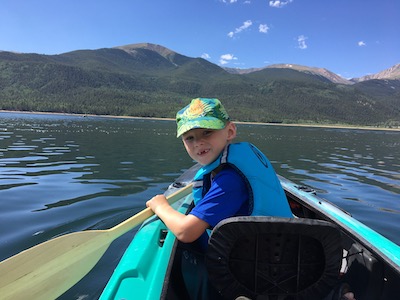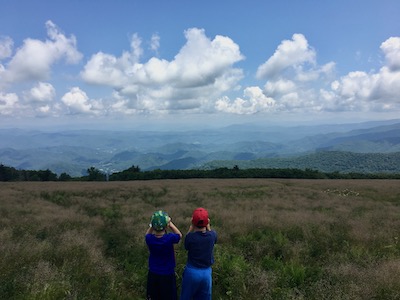Sara Osborne is a writing instructor at College of the Ozarks, a lifelong learner, and the mother of four curious explorers. She and her husband are always on the lookout for the next family adventure.

It’s late May, and my boys are playing on the floor with a Lego dog sled and its canine companions as I pack our family’s bags for “the last frontier.” Alaska’s Dog Heroes and Jack London’s Northland Stories are strewn next to piles of base layers, down jackets, and raincoats. Our adventure is just days away, and the house is abuzz with excitement. A year of relative isolation has certainly offered us some benefits (e.g., family time, ad infinitum!), but our brood is ready to hit the road. We are tired of only seeing ourselves.
While wanderlust can be as dangerous as any passion taken to extremes, I propose that the world makes a wonderful classroom. As Mark Twain so eloquently put it in The Innocents Abroad, “Broad, wholesome, charitable views of men and things cannot be acquired by vegetating in one little corner of the earth all one’s lifetime.” Exploring new parts of the world (or country, or city, or neighbourhood …) offers an education in perspective and empathy accompanied by a practicum in applied philosophy. Travellers are exposed to the other in a unique way, offering both increased knowledge of other cultures and the opportunity to reflect on different worldviews in action. The world is a ready classroom.
Interdisciplinary Learning
Travel provides a rich environment for interdisciplinary learning. A people’s history mingles with its art and architecture; a place’s economy tells us something about its government and social ethics. A traveller cannot easily separate a culture into tidy compartments – nor should this be his goal. Addressing subjects such as science alongside history or theology next to visual art not only attracts our interest to potentially daunting subject matter, but it offers grand opportunities for connecting ideas. These experiences serve as small case studies for Christian worldview instruction. As Abraham Kuyper famously proclaimed, “There is not a square inch of the whole domain of our human existence over which Christ, who is Sovereign over all, does not cry, Mine!” For the teacher who longs for her students to see the world as a whole creation under the sovereign power of God, such a classroom is invaluable.
The value of the interdisciplinary classroom extends beyond the cultivation and connection of information and ideas, however. Learning through travel also affords students the opportunity to exercise different skills and learning styles in tandem. Exploring a new place or people is a multisensory experience. Students who might normally be impeded by a reading disability can learn through audio tours, visual displays and the sights and sounds of experience. Creatives can showcase their learning through journalling poetry or sketching art, nature and architecture. Budding botanists can keep plant logs and collect leaf rubbings. When the world is your classroom, assessment tools for all types of learners abound!
An Education in Virtue
In addition to intellectual stimulation, travel presents the student with a unique environment for character formation and development. Going somewhere new requires courage, flexibility, and resilience. Engaging with others successfully requires consideration and compromise. Natural friction occurs when we enter into someone else’s way of life – whether by stomaching unusual food, navigating foreign transportation systems or deciphering unspoken rules of commerce. Like sandpaper on wood, this friction rubs away at our pickiness and preferences, leaving us more well rounded and better able to cope with differences.
The cross-cultural experiences inherent in travel often serve to magnify our character flaws. We confront irritations and inconveniences in our traditional homes and classrooms, but these usually occur under certain frameworks and routines that provide boundaries of understanding. Most of the time, students understand the expectations of school behaviour, and children know the rules of their households.
When we enter into new places and cultures, our expectations are often shattered, and we struggle to orient ourselves to new rules and routines. The work of adjusting to this “otherness” is difficult, but rewarding, resulting in new-found courage, perseverance and empathy.

Enriching the Soul
Learning need not be assessed in order to be authentic, however. Alongside intellectual stimulation and character formation, travel also offers enrichment for the heart and soul – a sometimes elusive classroom experience. Who can quantify the value of encountering beauty in varied forms or participating in worship amongst the global church? Can we ever achieve proficiency in seeing God at work in the world? We are ever learners in this respect, and that is right and good. Encountering different ways of living, working, and even educating reminds us that being human is not a Western phenomenon – or Christian one. Travellers are exposed to a world of discovery, yet often that discovery makes a U-turn inward, forcing us to consider and reconsider what we believe, what we know, who we are, whose we are. With the world as my classroom, there is much room for such enriching thought.
With a few days left before our grand Alaskan adventure, we’re still marching methodically through reading lessons and math drills. We won’t throw out our regular curricula when we return home. Exploiting travel as a tool for education doesn’t mean we’ve sold all we own to “worldschool” in an RV (although that admittedly has a certain allure to it!). Still I wait with curious anticipation, wondering how this next journey will change us all – as individuals and as a family. Fellow traveller Tsh Oxenreider quotes Wendell Berry to describe this individual and yet communal experience: “Nobody can discover the world for someone else. Only when we discover it for ourselves does it become common ground and a common bond and we cease to be alone.” With long summer days ahead, ripe for travel and exploration, the world is my classroom – and yours. May we steward well these God-given opportunities for learning, growth and togetherness.
The Kirby Laing Centre for Public Theology in Cambridge. Charity registered in England and Wales. Charity Number: 1191741
Kirby Laing Centre, The New Mill House, Unit 1, Chesterton Mill, French’s Road, Cambridge, CB4 3NP
© 2022 The Kirby Laing Centre for Public Theology in Cambridge